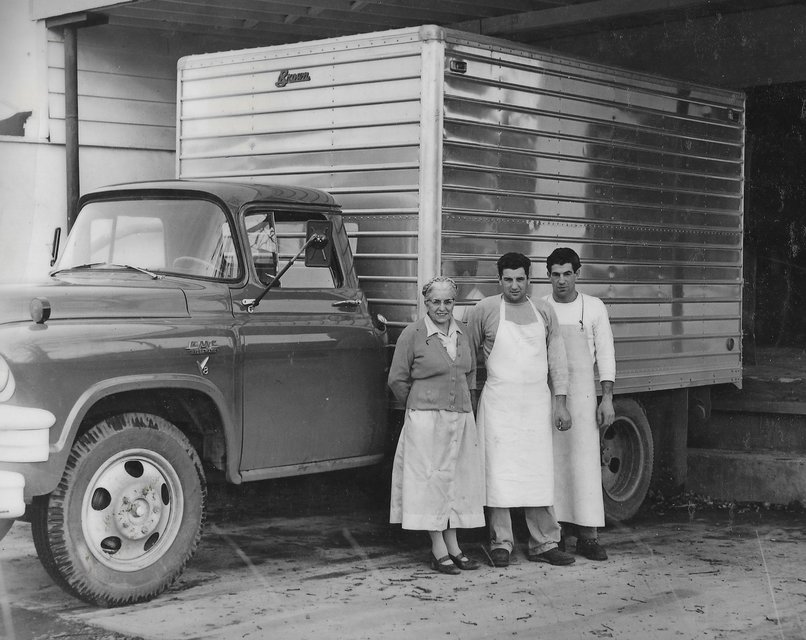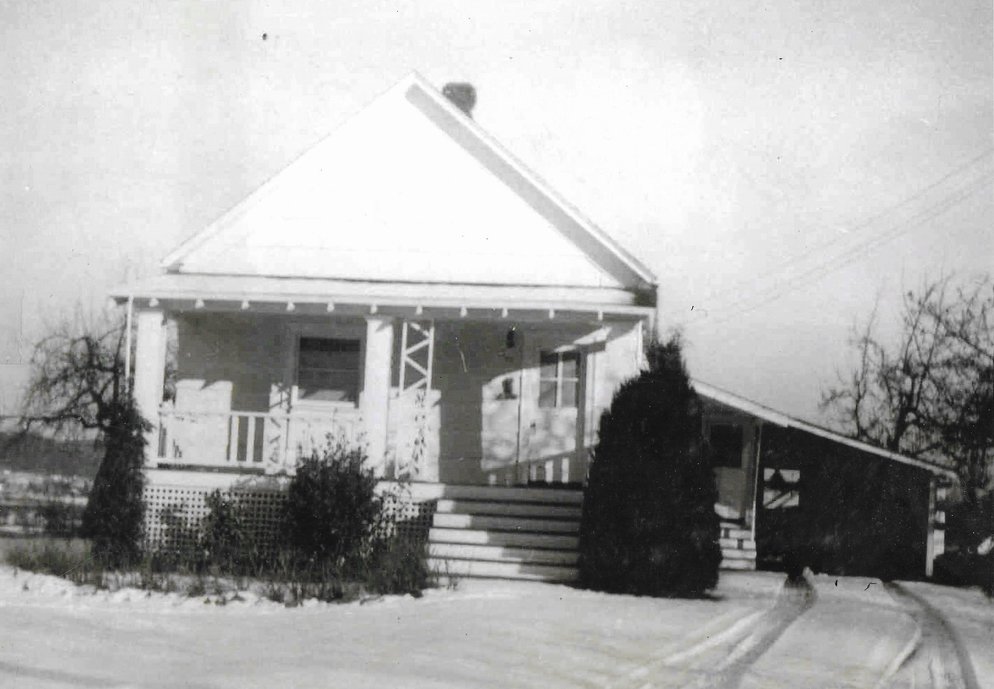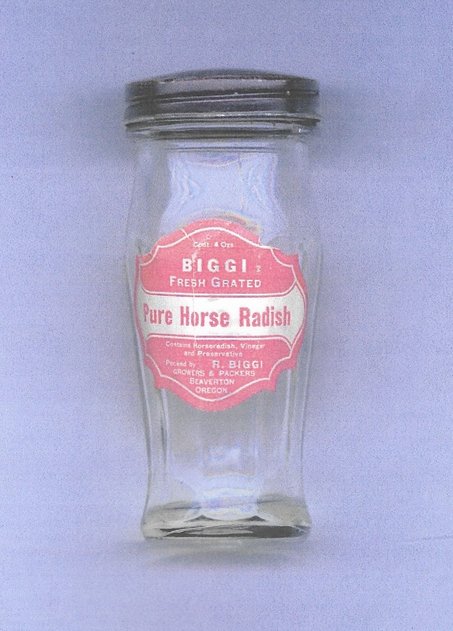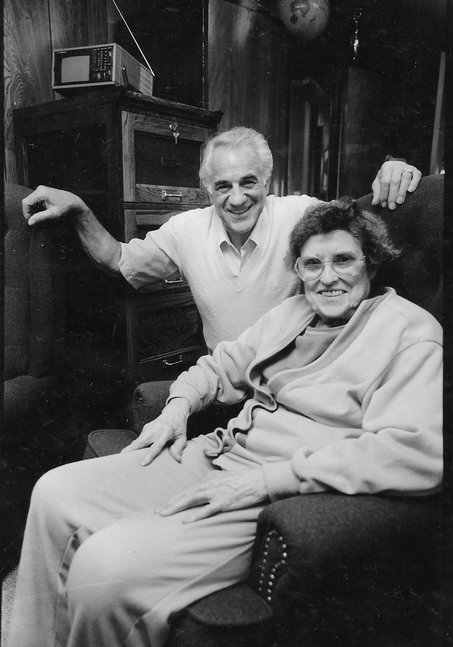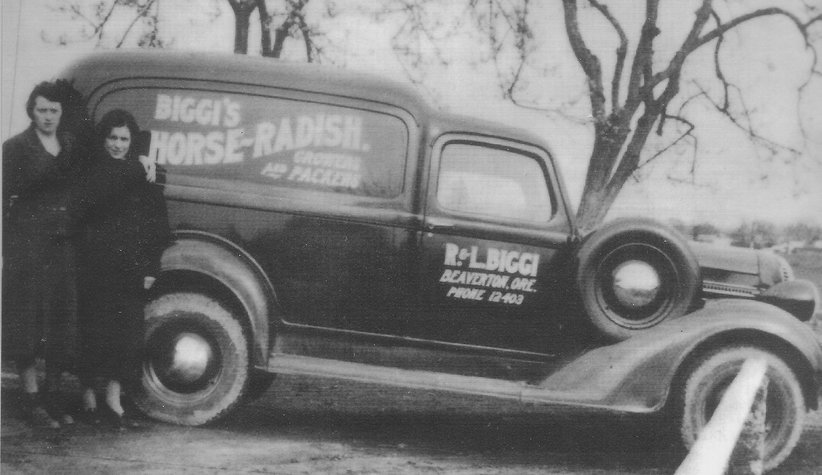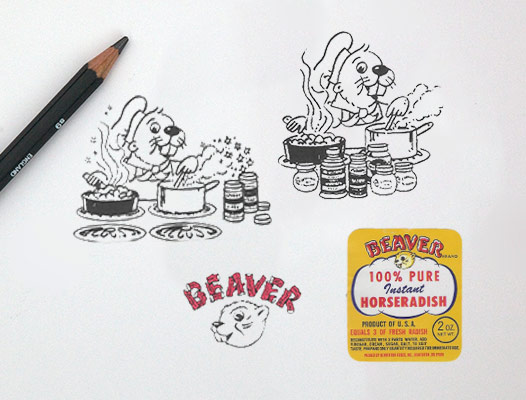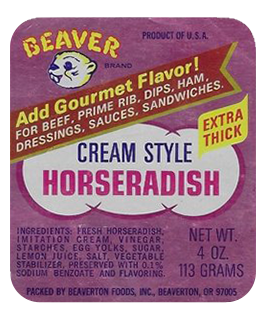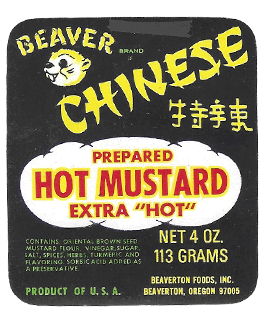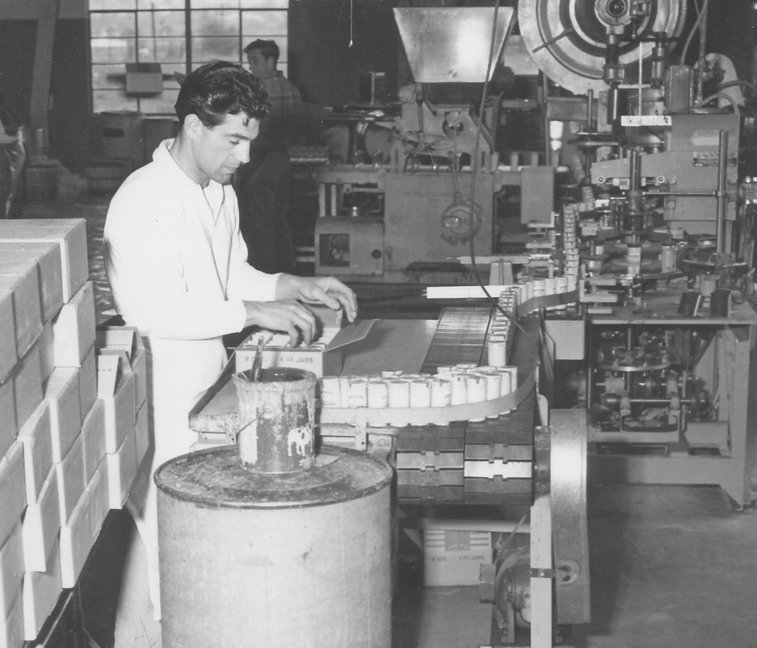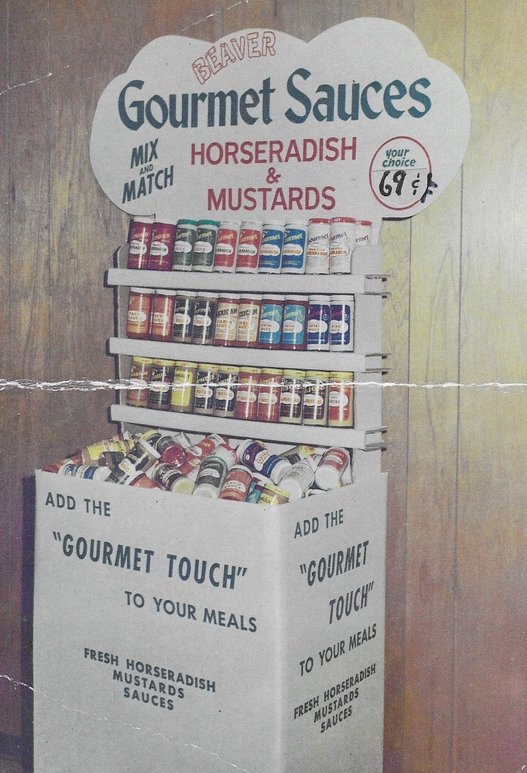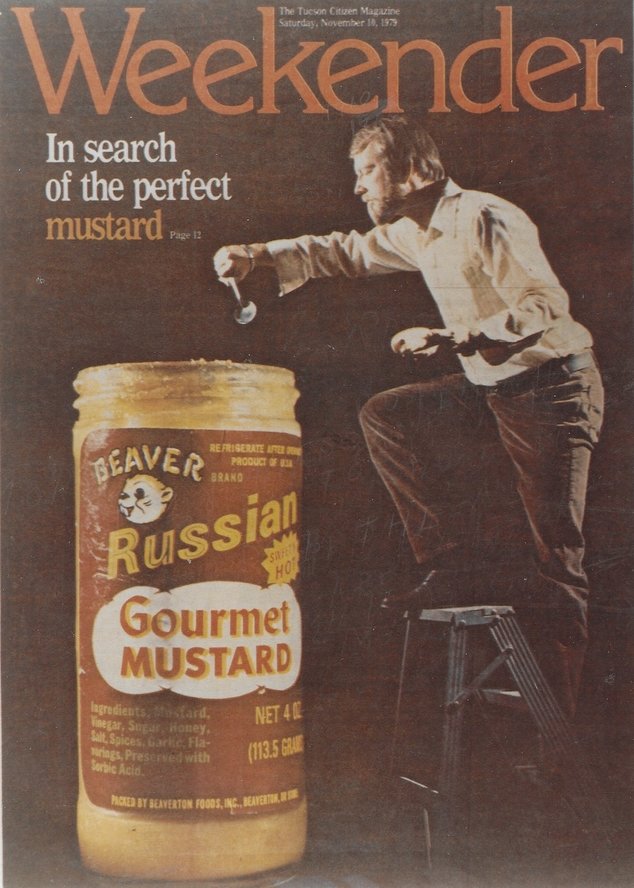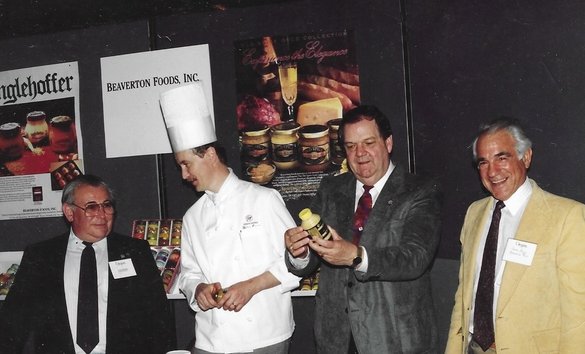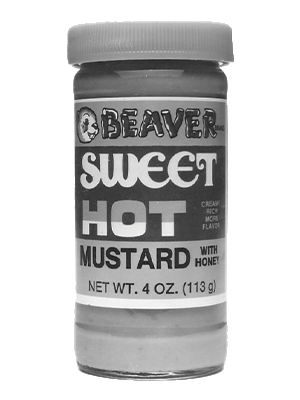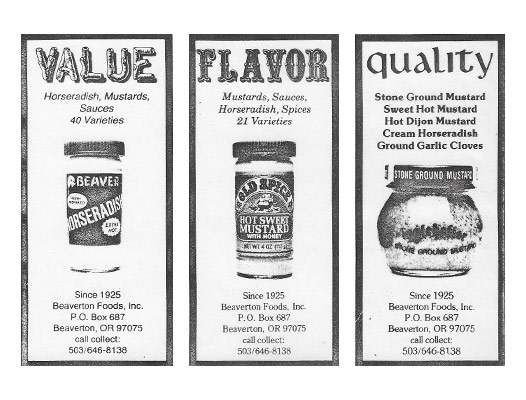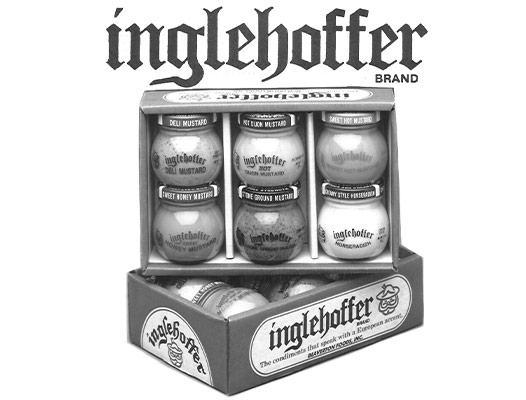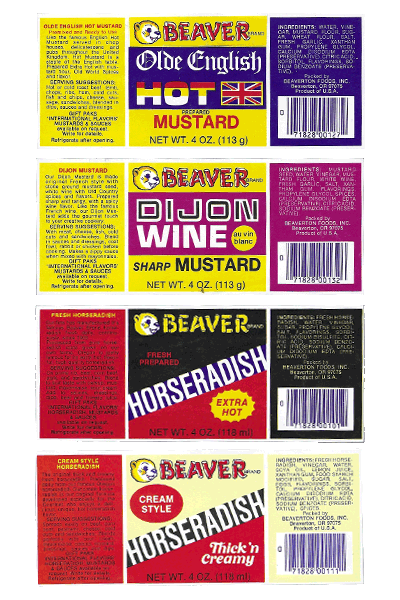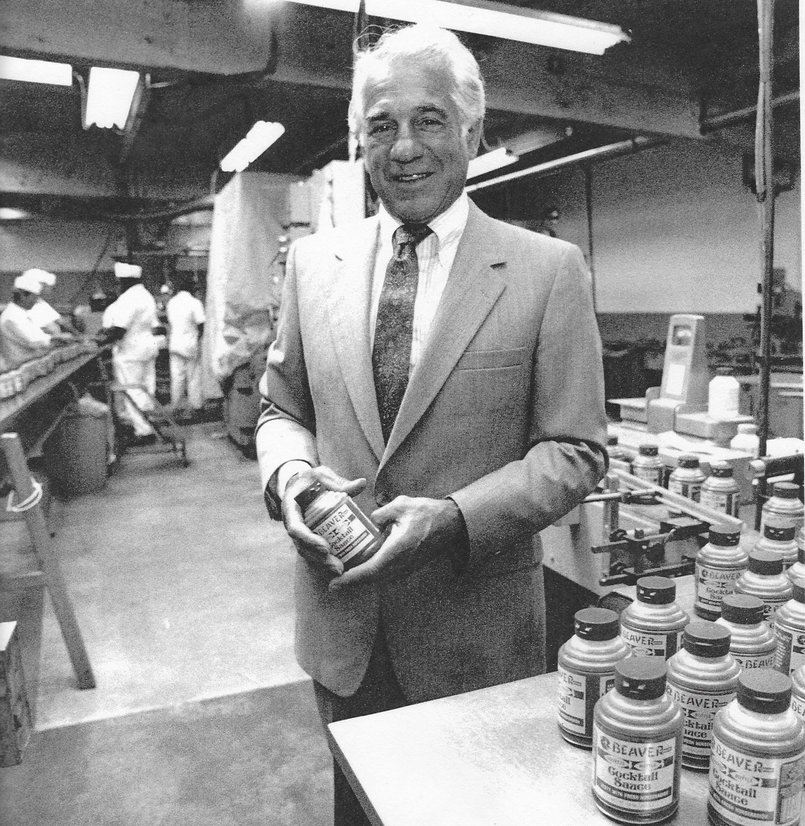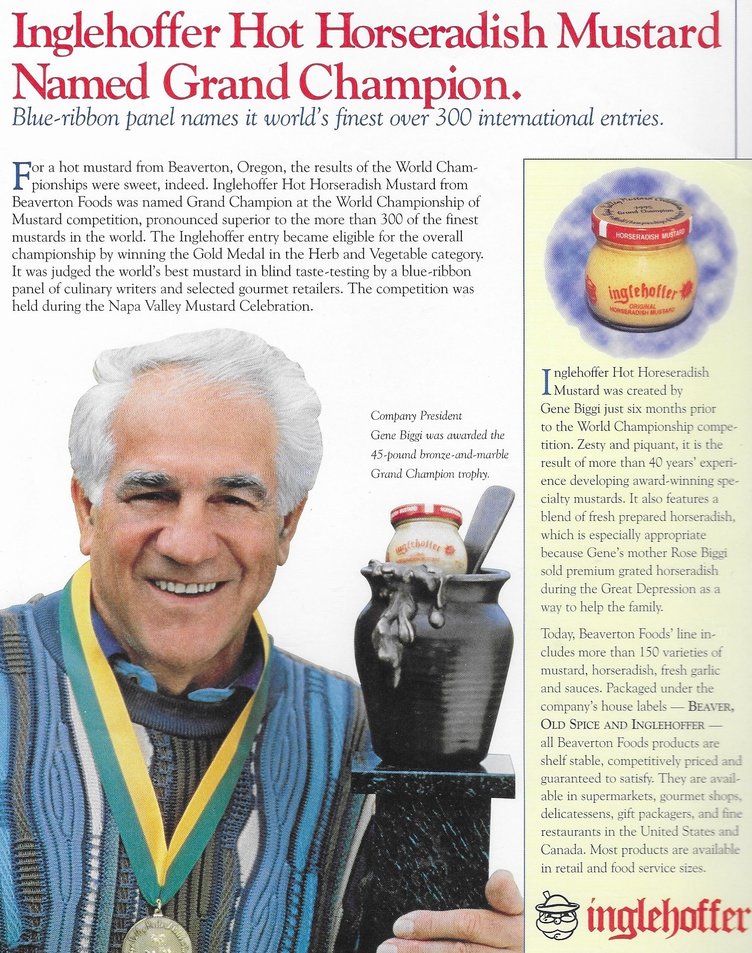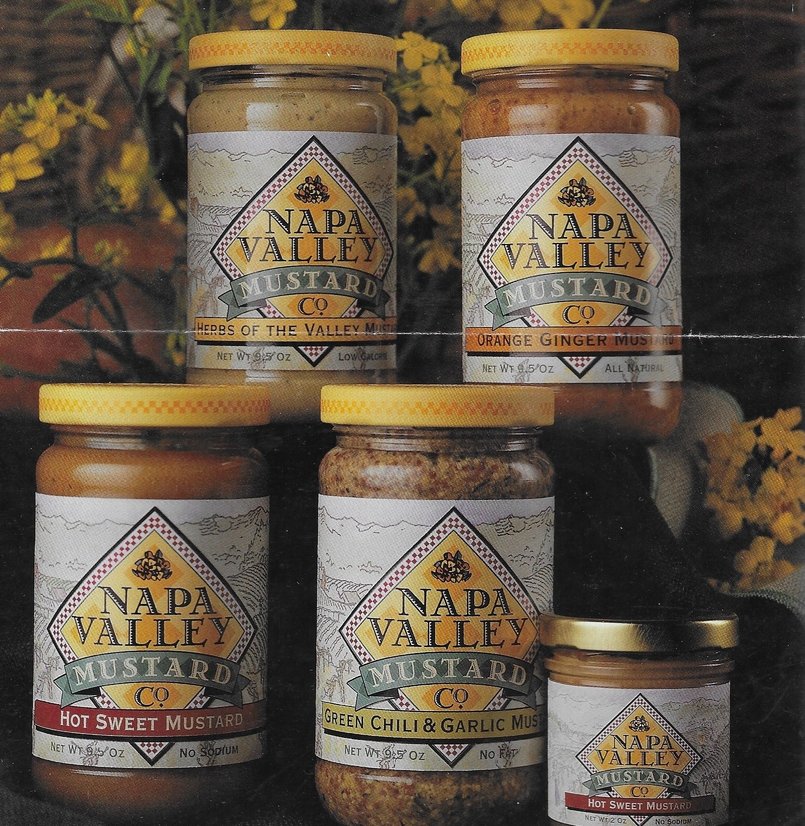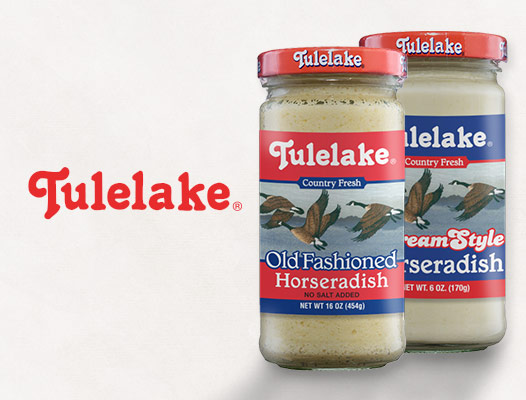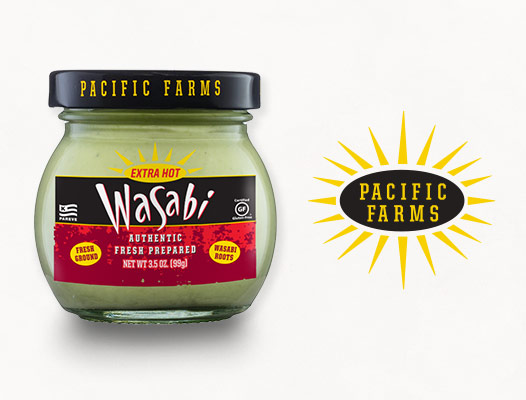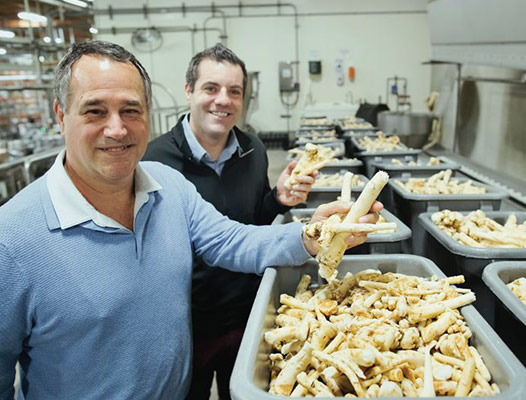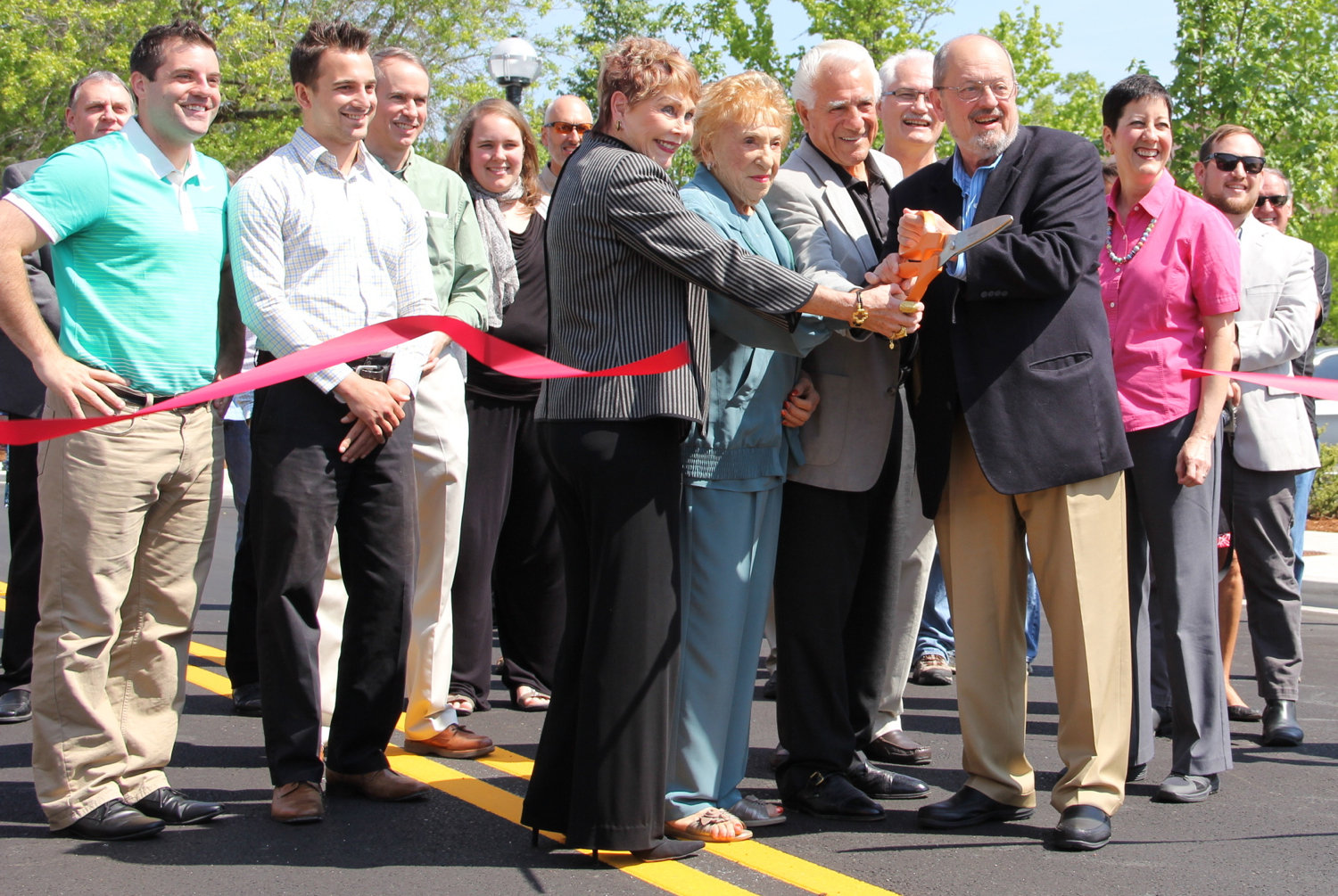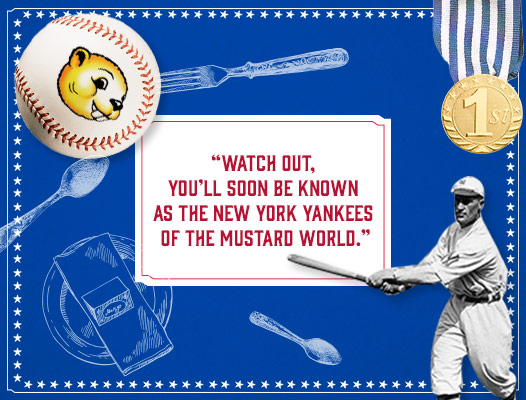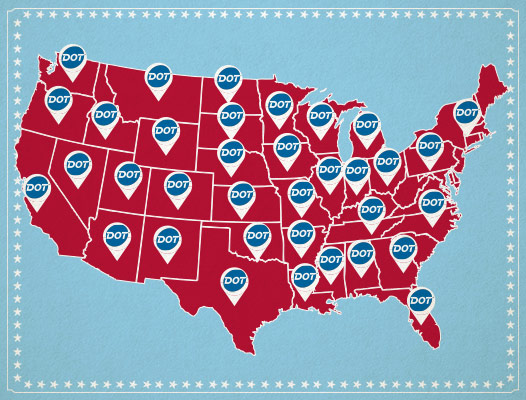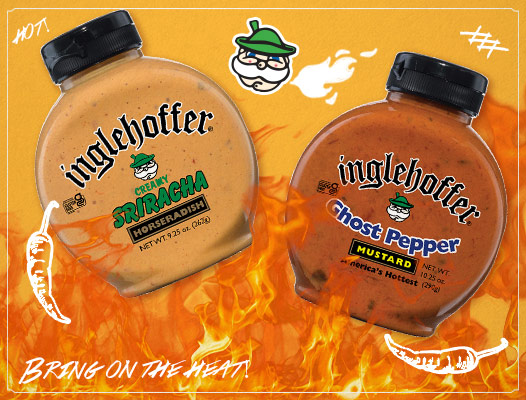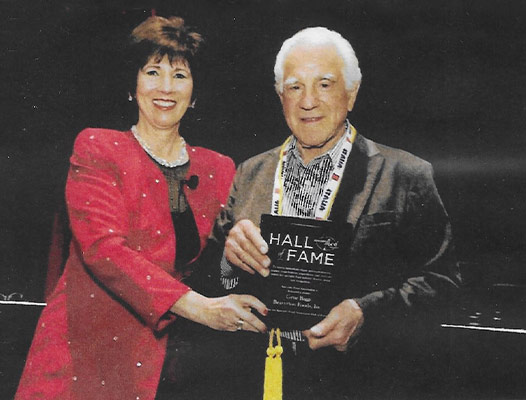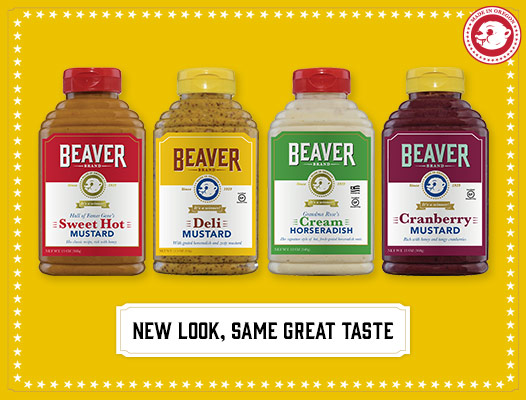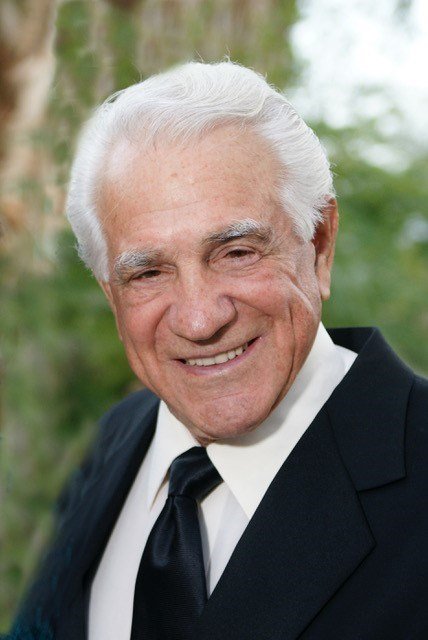In 1910, Rose Biggi (the eldest of 7 daughters) and her family emigrated from Italy to the United States. Nineteen years later they drove from Beaverton to Portland to sell vegetables (including horseradish roots) at a local farmer’s market to make money during the Great Depression. One day, Rose bought a cup of coffee at the market and met Eve Grubmeyers – wife of Fred Grubmeyers. The two became close friends. In 1931, Fred and Eve opened Oregon’s first supermarket, Fred Meyer, and began grinding Rose’s horseradish for their deli department. Today, Fred Meyer has merged with Kroger and is one of the largest grocery store chains in America. Stores in many western states retain the brand name Fred Meyer.
Rose’s horseradish sold well at Fred Meyer, but the fumes drove customers out of the store. Eve convinced her friend to start grinding her own roots at home. And so she did. In the basement of her farmhouse, Rose washed the roots, removed any black spots, and ground horseradish with a cheese grater. Her hands and eyes burned during the process, but she persisted – desperate to provide for her family during the Depression. She bottled and sold her products under the label R & L Horseradish.
Rose quickly began supplying local meat markets and small grocery stores in Beaverton, Hillsboro, and Portland. Many stores were not able to buy the product, but would trade it for meat or grocery items they couldn’t sell. Rose was happy to be able to feed her family and pay the bills. As time went on, her business grew as she increased sales and acquired new accounts.
Rose Biggi’s first employee was named Esther. She was originally hired to babysit Rose’s sons, but Rose figured she might as well help put lids on jars, too. Esther started at 15 cents/hour. She quickly took over the job of making product deliveries and eventually ran the entire horseradish preparation department (with an “iron fist” as Roses’s son, Geno, puts it). Esther worked for Beaverton Foods for 63 years. She never missed a single day of work and never asked for a raise (though she was given them!). Rose loved her like a daughter and the kids considered her family. To this day, Geno credits her for teaching him how to work hard: “I was very fortunate to work with Esther and my mom for over 40 years. I never once heard them say they needed a break. Some days they worked 12 to 13 hours, taking only a few minutes to eat and then get back to work.”
After years of saving, Rose purchased land from the city of Beaverton for $4,600 and R & L Horseradish became The Beaverton Horseradish Company. Over 70 after starting the business, her son, Geno, would change the name to Beaverton Foods and build a new, 80,000 square foot manufacturing plant. Everyone at Beaverton Foods still remembers Rose as an innovator who, against all odds, built what is now the largest distributor of specialty condiments in America. Domonic still has his Grandma’s chair in his office and her presence is felt throughout the new plant to this day.
Until this point, Beaverton Foods was still called Beaverton Horseradish company. A broker advised Geno that the business would be limited to only horseradish if he didn’t change its name. Since Geno was already producing mustard at the time, he began brainstorming a new name. One day at an Oregon State football game, he noticed the Oregon State beaver icon. Shortly after, he met with a local artist who created many varieties of beaver logos. Geno eventually decided to stick with one beaver head in particular – the face of Beaver Brand ever since.
One day in the early 1950s, Geno made his usual roast beef sandwich by putting horseradish on one side of the bread and mayonnaise on the other. Then an idea hit him: why not mix the two? The result was America’s first Cream Style Horseradish. Geno eventually developed a shelf-stable variety and a new, whipped horseradish product as well. Beaverton Foods continues to sell its Cream Style Horseradish in grocery stores around the country today.
In the early 1950s, Geno discovered a delicious hot mustard while eating at a local Chinese restaurant in Beaverton. He asked the chef where he purchased his product. Apparently, the chef told Geno, the product had to be made from scratch daily using mustard flour, otherwise it would get bitter and lose its heat. Geno couldn’t find any Chinese hot mustard in any of his local grocery stores, either. He went to work and eventually discovered a way to preserve the extra hot mustard. Beaver Brand Chinese Hot Mustard took off! It was a new first that built the creative foundation for new unique flavors in the future. You’ll still find it sold in almost every major grocery store in America.
In 1965, a trade magazine published an article about Beaverton Horseradish Company’s first automatic bottling machine. The article caught the attention of a food broker named Sam who reached out about representing the company in northern California. Since the company didn’t do any business in California at the time, Geno gladly accepted. Sam and Geno remained business partners and friends for many years. Geno remembers Sam fondly, saying “I was very fortunate because Sam was one of the best things that ever happened to Beaverton Foods… he was one of the very best.” The company wouldn’t be what it is today without his support.
In the late 1950s, brokers in the Portland area wouldn’t accept Beaver Brand products – claiming there was no market for specialty mustard and too many brands of horseradish. Since there was “no space” on the grocery store shelves, Geno decided to market his products in “dump bins” in the deli department. He placed 11 cases of assorted 4 oz products priced at 69 cents apiece. They sold like crazy! Shoppers loved the products and grocery stores loved the arrangement because the cases took up no shelf space. Several years later, a few stores allowed Beaver Brand products on the selves of their mustard sections. Today you can find Beaver Brand products in grocery stores all across America, the UK, and Canada.
In 1960, a broker showed Geno a new style of Russian Sweet Extra Hot Mustard. The flavor was good, but the product separated from the bottom of the jar and quickly became discolored. As usual, Geno accepted the challenge. He began experimenting with a new formula and discovered a way to enhance the flavor without the separation or discoloration. The product sold to stores throughout the country! Geno realized that his small company would have to produce original, high-quality flavors in order to compete in what was emerging as the specialty food industry. The experience clarified his vision for what is now the Beaverton Foods of today – with over 100 unique and delicious products.
In 1964, Geno met a man named Irvin and his father who owned a large specialty food company in Vancouver, Canada. The pair was impressed with Beaver Brand horseradish, and the relationship grew quickly. Irving pioneered the distribution of Beaver Brand products in Canada – Beaverton Foods’ first international market. Irvin came to be one of the brand’s best distributors – and a close friend. Geno always remembered Irvin as a hard worker and great friend.
In 1972, the famous Swiss Colony stores in California asked Geno to produce a sweet mustard for their brand. He worked up several formulas using sugar, but each failed when blended in factories. Geno was just ready to give up on the project when he met a local honey farmer in Beaverton. He took a few honey samples home and decided to try one more formula. To his surprise, it was perfect! Swiss Colony began selling it under its label. Unbeknownst to Geno, this was the first sweet hot mustard made with honey.
Geno wanted to test this product on the public himself. He found that most people liked the sweet flavor, but didn’t like their mustard “hot,” so he developed a sweet honey mustard formula under his own Beaver Brand label. Beaver Honey Mustard became a huge success and helped Beaverton Foods achieve notoriety.
As years passed, other companies began copying the formula. Geno took great pride that a small company in Beaverton played a part in launching what would soon become the specialty mustard industry with the advent of honey mustard.
In 1974, Geno experienced what he called “the longest three days of his business life.” After failing to sell any cases at the yearly Fancy Food Show in San Francisco, he thought his dream was over. Then he got lucky. In 1975, a famous chef named James Beard contacted mustard companies around the world. He was writing an article for Esquire Magazine about the best mustard, domestic or imported, sold in America and asked each company to send its best products for him to taste. When the article was written, James Beard awarded Beaverton Foods 5 of the top 11 mustard spots – giving the company top honors for “value, flavor, and quality.” Companies the world over could not believe a small company in Oregon could produce such great products.
In the ’70s on a trip to Los Angeles, Geno discovered a unique, round jar labeled “German Style Stone Ground Mustard.” The brand was Inglehoffer and he quickly fell in love with both the product and the packaging. Shortly after this trip, Geno met with the owners of Inglehoffer and began co-packing and distributing Inglehoffer products throughout Southern California. 6 years later, the owners sold the brand to Geno. Today, Inglehoffer is the largest and fastest-growing line of specialty condiments in America.
In the 1980s, Beaverton Foods decided to make some label improvements. Distributors were finally taking notice of Beaver Brand products and the company wanted to make sure customers could find their products on shelves. At the time, Beaver Brand was only selling small, 4 oz jars with little space. The new labels included a larger Beaver Brand head, rich colors, and large letters. They were a success! Customers could see the products and they were much easier to locate on shelves. Today, every Beaverton Foods label continues the tradition of large fonts and bright colors.
In 1986, Geno was approached by a deli owner after a Fancy Food Show who was interested in packaging mustard in squeeze bottles instead of glass jars. At the time, grocery stores only sold yellow and spicy brown mustards in squeeze. All specialty mustards were packaged in fancy glass jars, mugs, and crocks and imported from Europe. In fact, American companies said it couldn’t be done at all – the products would spoil and lose flavor. After being told he’d never be able to sell squeeze, Geno developed his own unique, squeeze bottles for Beaver Brand products. He packed up an old van and brought cases to local grocery stores. To his surprise, the critics were wrong and the products flew out of the stores! With this achievement, Beaverton Foods became the pioneer of the first-ever squeeze bottle for specialty mustard.
In 1995, the first World Championship of Mustard competition was held in Napa Valley, California. That year, Inglehoffer became Grand Champion for its Horseradish Mustard out of over 300 competitors. Today, mustard companies continue to compete each year for medals in various categories as well as to be the overall champion. Beaverton Foods has won medals in every category – and more collectively than all other mustard companies combined.
In 1993, Geno was introduced to the owner of the Napa Valley Mustard Company at the Fancy Food Show in San Francisco. The two quickly became friends. Soon after, Beaverton Foods began producing Napa Valley’s products in its plant. In 1998, Beaverton Foods acquired the business entirely. The products soon became a favorite for gift packs, offering unique flavors with ingredients from the Napa Valley region.
In 1999, the City of Beaverton informed Beaverton Foods that a new road was to be built that would run through its plant – which included the same farmhouse in which Rose started the R & L Horseradish company 70 years earlier. Her son, Geno, built 7 additions to that farmhouse over a 60 year period and was running out of space to expand the business. At 72 years old, he had to decide whether or not to build a new, state-of-the-art manufacturing plant or sell his family-owned business. As always, he chose to innovate. The city tried to relocate the farmhouse, which was deemed a “historical landmark” – but could not find a new place for the historic home. It was soon demolished and replaced with the new road.
After deciding to expand, Geno began building a new, 80,000 square foot manufacturing plant in nearby Hillsboro – well over twice the size of the previous plant. The building opened its doors in 2001, about a year after the old plant was officially demolished. What was once a difficult decision quickly became a success as Beaverton Foods doubled its production within 5 years of completing the build. Today, Beaverton Foods is one of the most modern and efficient plants in the country. The new space also allowed its team to develop new formulas, with the goal of introducing at least one new, unique product each year. To date, Beaverton Foods has more unique flavors than any other condiment company on the market – something that Founder, Rose Biggi, could only dream of.
Since 1929, you would be hard-pressed to find a day there wasn’t one Biggi or another at Beaverton Foods. Rose passed ownership of the company to her son, Geno, who hoped to have the opportunity to pass it to his son – and then on to future generations. In 2012, Geno did just that by making his son, Domonic Biggi, CEO of Beaverton Foods and initiating the third generation of the company. Geno’s grandson, Jeffrey Biggi, has since become President – and the 4th generation of Biggi to work at Beaverton Foods. The two of them hope to make their family proud and continue developing unique flavors that will hopefully one day become “winners” – in the words of Geno.
In 2013, Beaverton Foods introduced Beaver Brand Coney Island Hot Dog Mustard and American Picnic Mustard to the UK – followed by 3 additional Beaver Brand products the next year. The expansion into the UK market marked an important milestone for Beaverton Foods as it continues to find ways to share its unique variety of products and flavors with the world.
20 years after Rose Biggi passed away, the City of Beaverton held a ceremony celebrating her achievements. The Mayor of Beaverton, Denny Doyle, led the effort and acknowledged Rose’s contributions to the city by naming a street in her honor. Her street, “Rose Biggi Avenue,” now runs adjacent to the land where she started her company. “The Biggi family has been an important part of Beaverton’s history. It is a privilege to officially recognize the opening of this new street that honors Rose and her legacy,” said the mayor. On that day, four generations of family members attended the ceremony – including Rose’s son, Geno, who helped pioneer the specialty mustard industry and is now in the Specialty Foods Hall of Fame.
In 2015, Beaverton Foods hit a grand slam earning 3 gold medals (and 9 total medals) at the 20th annual World-Wide Mustard Competition. The international competition has included entries from Japan, Greece, and Sweden and boasted 50 judges. Beaverton Foods has won more than 150 medals at this annual competition. Barry Levenson, curator of the National Mustard Museum noted, “watch out, you’ll soon be known as the New York Yankees of the mustard world.”
In 2015, Beaverton Foods inked a deal with Dot Foods, the nation’s largest food redistribution company, making its product available in all 50 states and 25 countries. Domonic Biggi, CEO of Beaverton Foods said, “[this deal] means we have national distribution capabilities that we’ve never had. Mom and pop restaurants now have access to our specialty condiments through Dot Foods. In the past, we managed our distribution all in house and we were often limited to the West Coast.”
In 2016, Beaverton Foods introduced two new products created by Geno Biggi: Inglehoffer Ghost Pepper Mustard and Sriracha Horseradish. “There is an ever-increasing demand for extra hot and spicy foods nationwide and globally,” said Domonic Biggi, CEO of Beaverton Foods. “Ghost pepper is a hot trend right now. In addition to meeting market demands, we also like to be the first to offer a new flavor profile and the new creamy Sriracha Horseradish is a first.”
In 2015, the Specialty Foods Association established its own “Hall of Fame.” A year later, Geno Biggi was honored for his role in pioneering and building the specialty food industry. Barry Levenson, curator of the National Mustard Museum said of Geno: “He never ceases to amaze me. He still comes up with new mustard flavors that seem to anticipate the hottest trends in taste. He’s not only imaginative; he is also fearless. Not every flavor will take off, but he is willing to commit to adventurous flavors.” Geno was humbled by the notable honor and expressed thanks to everyone who has helped Beaverton Foods succeed for over 90 years. He took great pride in watching his business be passed to third and fourth generations.
In 2020, Beaverton Foods completed a two-year rebranding process to highlight its successes over the past 91 years and celebrate a history that spans 4 generations of family members into present day. The labels include two “showcase” products featuring Grandma Rose (Founder) and Geno Biggi (Chairman). The updated Beaver logo includes a “Made in Oregon” stamp – the state to which Grandma Rose immigrated in the late 1800s. You’ll also find the tagline “It’s a winner!” on each label – a phrase Geno used after he developed a formula. In fact, Beaverton Foods has won more quality awards than any other brand in the specialty food category. That’s why CEO, Domonic Biggi, says: “We know with confidence that when consumers share our family of products with their friends and family they will understand and agree why we say: ‘It’s a winner!’ on our label.”
On December 10, 2022, the Maestro of Mustard, praised by James Beard, and Specialty Foods Association Hall of Famer, Gene (Geno) Louis Biggi, passed away at his home in Palm Desert, California at 94 years old. His incredible journey through life was paved with a pride in hard work, which he learned early in life from his mom. From the 15 acres of farmland she purchased in Beaverton, Oregon in the early 1920s, Geno built a multi-generational, international, award-winning specialty condiment company with a state-of-the-art manufacturing facility with over 100 employees and products in over 97% of grocery stores in America. In addition to his pioneering work at Beaverton Foods, Geno was an avid golfer with 2 hole-in-ones. He loved skiing with his friends and enjoyed spending time and sharing stories with his many friends and family. He also became a major investor in real estate. With his former wife, Lindi Biggi, he was a major contributor to Beaverton’s Patricia Reser Center for the Arts. Geno was a beloved husband, father, grandfather, and great-grandfather. He is survived by his children Allyson, Dean, Domonic, Dana, and Anthony Biggi, and grandchildren Jeffrey, Geno, Luke, Jake, Mia, Nieco, and Roman Biggi.
Domonic Biggi, CEO at Beaverton Foods, is inducted into the Specialty Foods Association’s Hall of Fame.
Beaverton Foods celebrates its 95th anniversary with the addition of three new products and the promotion of Jeffrey Biggi, the 4th generation Biggi at Beaverton Foods, to President.

